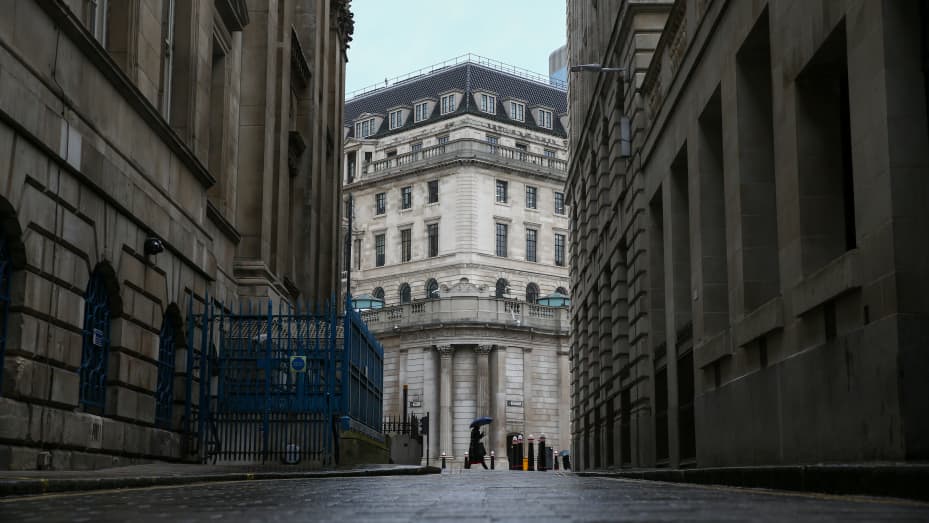风萧萧_Frank
以文会友- Bank of England Governor Andrew Bailey said Wednesday that the bank was “justified” in its decision to raise interest rates by a surprise 50 basis points last week.
- The move defied market expectations of a 25 basis point hike and reignited debate among critics who say that the central bank has failed to act quickly and decisively enough to tackle rising costs.
- “We had to make really quite a strong move at that point. It was justified,” Bailey told CNBC’s Sara Eisen at the European Central Bank’s annual conference in Sintra, Portugal.

Bank of England Governor Andrew Bailey said Wednesday that the bank was “justified” in its decision to raise interest rates by a surprise 50 basis points last week.
The move defied market expectations of a 25 basis point hike and reignited debate among critics who say that the central bank has failed to act quickly and decisively enough to tackle rising costs.
Bailey said he accepted the criticism, but insisted that the Monetary Policy Committee remains committed to its task: to return inflation to 2%.
“We had to make really quite a strong move at that point. It was justified,” Bailey told CNBC’s Sara Eisen at the European Central Bank’s annual conference in Sintra, Portugal.
“I can understand why there are critics of us and central banks,” he added.
“We have a job to do. Our job is to return inflation to target and we will do what is necessary. I understand the concerns that go with that, but I’m afraid I always say that it is a worse outcome if we don’t get inflation back to target.”
Fresh data last week showed annual U.K. consumer price inflation was 8.7% in May, exceeding expectations and adding to pressure on the bank, which has struggled to bring down inflation at the same pace as some international peers.
Critically, core inflation — which excludes volatile energy, food, alcohol and tobacco prices — was 7.1% year on year in May, up from 6.8% in April and marking its highest rate since March 1992.
Bailey said the bank’s main objective was to lower core inflation, which had proven “much stickier” in part due to the strength of the U.K. labor market. That robustness also saw the bank reverse its earlier prediction that Britain was on course to enter its longest recession on record.
"We're going through this year in a more resilient position than I expected," he said.
The governor would not be pressed on when inflation might return to target, and insisted that the bank’s next rate decision — due in August — would be “evidence driven.”
Bailey was speaking on a panel alongside fellow central bank chiefs from the U.S. Federal Reserve, European Central Bank and the Bank of Japan.
Fed Chair Jerome Powell said that he anticipated further interest rate hikes ahead, potentially at an aggressive pace.
Bank of England surprises with 50 basis point rate hike to tackle persistent inflation
- Thursday's 50 basis point hike surprised markets, which had priced in a smaller rise.
- Policymakers are walking a tightrope as they attempt to tighten monetary policy sufficiently to quell inflationary pressures without triggering a full-scale mortgage crisis and recession.
- Core inflation — which excludes volatile energy, food, alcohol and tobacco prices — was 7.1% year on year in May, up from 6.8% in April and the highest rate since March 1992.

LONDON — The Bank of England on Thursday surprised markets with a 50 basis point hike to interest rates, its 13th consecutive increase as policymakers grapple with persistently high inflation.
The Monetary Policy Committee voted 7-2 in favor of the half percentage point increase, which takes the bank’s base rate to 5%. The move defied market expectations, which had priced in around a 60% chance of a 25 basis point hike.
Fresh data on Wednesday showed annual U.K. consumer price inflation was 8.7% in May, unchanged from the previous month, cementing market expectations that the MPC would opt for another hike. Economists also upped their expectations for further monetary tightening in the future.
“There has been significant upside news in recent data that indicates more persistence in the inflation process, against the background of a tight labour market and continued resilience in demand,” the MPC said in its summary Thursday.
“The MPC will continue to monitor closely indications of persistent inflationary pressures in the economy as a whole, including the tightness of labour market conditions and the behaviour of wage growth and services price inflation. If there were to be evidence of more persistent pressures, then further tightening in monetary policy would be required.”
Policymakers are walking a tightrope as they attempt to tighten monetary policy sufficiently to quell inflationary pressures without triggering a full-scale mortgage crisis and recession.
The MPC said that the high number of fixed-rate mortgages means that the full impact of the increase in the bank rate so far “will not be felt for some time.”
Since the end of 2021, the bank has hiked its main rate from 0.1% to 5%.
“The economy is doing better than expected, but inflation is still too high and we’ve got to deal with it,” Bank of England Governor Andrew Bailey said in a statement Thursday.
“We know this is hard — many people with mortgages or loans will be understandably worried about what this means for them. But if we don’t raise rates now, it could be worse later.”
A ‘hawkish super-hike’
Although the market had partially priced in the larger increase, several analysts suggested that the size of the majority voting in favor of it implied a sense of urgency among MPC members.
Joseph Little, global chief strategist at HSBC Asset Management, said the “hawkish super-hike” comes at a critical juncture for the economy and signals policymakers’ desire to “get ahead of the curve.”
“The U.K. finds itself in the worst position of major western economies. A cost of living crisis, brought about by rising energy and food prices, has been amplified by structural labour shortages, and has now metastasised into ratcheting wages,” Little said.
“Inflation pressures show more persistency and more momentum than other western economies, and that forces the Bank into a hawkish corner. Today’s statement has increased concerns of a much-higher terminal policy rate, perhaps as high as 6%.”
Although all developed economies endured a similar post-Covid pandemic deluge of inflationary pressures, U.K. headline inflation is decelerating at a much slower rate, while the core component is significantly higher than all other G10 nations and still accelerating.
Huw Davies, investment manager at Jupiter Asset Management, said Thursday’s move from the MPC was “a tacit admission that they have been behind the curve in their hiking policy,” and the rate rise represents “an attempt to regain the initiative and their credibility.”
“The key problem is that U.K. real rates have consistently been negative despite the tightening cycle. It feels like the BOE will have to inflict more pain on U.K. households to achieve a return to a controlled level of inflation more in line with their inflation target,” Davies said.





